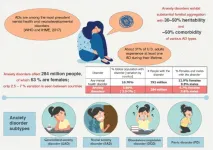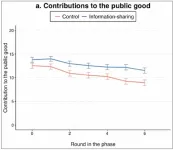(Press-News.org) Kyoto, Japan – December 2023
Anxiety disorders (ADs) affect more than 280 million people worldwide, making them one of the most common mental health conditions. ADs have a genetic basis as seen from inheritance in families, and people with one subtype of AD tend to have another subtype, suggesting a shared genetic basis. Although the brain circuitry involved in ADs has been identified, its link with gene expression remains unclear. Two researchers at Kyoto University in Japan set out to uncover this link and found two gene clusters expressed in the brain.
In previous research, targeted gene sequencing and genome-wide association studies (GWAS) have revealed frequently occurring mutations in people with AD or anxiety-associated personality traits. These mutations have been mapped to specific genes in the human genome. Meanwhile, neuroimaging techniques such as functional MRI (fMRI) and PET scans have shown that activity in specific neural circuits can predict anxious temperament in rhesus macaques, and micro-stimulation techniques in these monkeys can demonstrate which neural circuits are involved in the AD symptoms.
The Kyoto University researchers, Ms. Karunakaran and Dr. Amemori, investigated whether AD-associated genes are expressed in the same neural circuits identified by the imaging and micro-stimulation techniques. Specifically, they examined whether the regions where AD-associated genes are expressed could reveal the neurocircuitry of AD by analyzing the spatiotemporal transcriptomic data of more than 200 genes linked to four AD subtypes, generalized anxiety disorder, social anxiety disorder, obsessive-compulsive disorder, and panic disorder, in over 200 brain regions of normal human brains available in the Allen Brain Atlas.
Using statistical tests, the researchers found that AD-associated genes are highly expressed in the cerebral nuclei, the midbrain, and the limbic system. Further analysis of these areas by hierarchical clustering showed two AD gene clusters with distinct spatial expression profiles—one highly expressed in the limbic system and a specific set of cerebral nuclei and the other in the midbrain and a different set of cerebral nuclei; previous physiological research had suggested that these brain structures are involved in regulating AD behaviors. Additional analyses revealed that the two clusters were indeed linked to different behaviors. The two clusters also showed distinct enrichment patterns for subtype-specific genes, establishing a clear link between each cluster and specific AD subtypes.
One cluster was involved in glutamatergic receptor signaling, while the other was associated with serotonergic and dopaminergic signaling, further supporting a dichotomy in the neurophysiology of ADs. Additionally, the two clusters were linked to distinct region-specific gene networks and cell types.
Finally, the researchers examined developmental transcriptome data to track the expression patterns of the AD genes during brain development and found that the two spatial clusters have distinct and negatively correlated identities at specific developmental stages. One cluster is highly expressed during late infancy and adulthood, while the other is expressed during the late prenatal stage and early childhood. Thus, mutations in AD-associated genes might disrupt the normal timing of their expression, potentially impacting the development of signaling pathways and neural circuits, thereby producing the symptoms associated with AD.
In this research, the scientists discovered two gene clusters associated with AD that have distinct spatial and temporal expression patterns and functional profiles within the human brain. Further investigation of these gene clusters might provide new insights into the underlying causes of AD.
END
Linking genes and brain circuitry in anxiety disorders
2023-12-19
ELSE PRESS RELEASES FROM THIS DATE:
A bacterial toolkit for colonizing plants
2023-12-19
Using a novel experimental approach, Max Planck researchers have discovered a core set of genes required by commensal bacteria to colonize their plant hosts. The findings may have broad relevance for understanding how bacteria establish successful host–commensal relationships.
Plants are colonized by an enormous variety of microorganisms, including bacteria, archaea and fungi, that form complex communities, or microbiomes, on their roots and organs. Although invisible to the naked eye, the importance of these tiny inhabitants should not be underestimated. They play a crucial role in plant nutrition, influence the health of plants, strengthen their tolerance to stress factors such as ...
Study provides new insight into low social determinants of health screening rates
2023-12-19
A new study provides the latest data on the low rates for screening and documenting Social Determinants of Health (SDOH) in healthcare settings.
SDOHs are a person's social, environmental and economic conditions highly correlated with their health outcomes. This includes unemployment, homelessness and illiteracy, among many other factors. Although SDOHs can contribute to a more comprehensive understanding of a patient's health and inform important policy changes, clinical offices fall short of tracking this information.
To better understand ...
FlexTech: A new era in flexible electronics research
2023-12-19
On December 9, 2023, the 5th International Conference on Flexible Electronics (ICFE 2023) was held in Hangzhou, China. The international academic journal, FlexTech, was officially inaugurated at this conference.
FlexTech is an initiative led by Tsinghua University, with academic support from the Laboratory of Flexible Electronics Technology Laboratory, Tsinghua University. This journal is co-published by Tsinghua University Press and John Wiley & Sons, Inc.
The editorial board of FlexTech is under the distinguished leadership of Professor Xue ...
Why do people age differently?
2023-12-19
CLEVELAND—Throughout our lives, changes in our DNA, called genetic mutations, occur in every healthy cell of the human body—mutations which have long been thought to be an important reason why our bodies age.
But it’s not known whether some people accumulate mutations at a faster or slower rate with age, and whether those differences might predict how long we live and the risk for aging-related diseases like cancer.
With a $3.5 million research project grant from the National Institutes of Health (NIH), Jonathan Shoag, a surgeon-scientist at the Case Western Reserve University School of Medicine and urologic oncologist at ...
Ali Khademhosseini named as 2023 National Academy of Inventors Fellow
2023-12-19
(LOS ANGELES) – December 18, 2023 - The National Academy of Inventors (NAI) has named Ali Khademhosseini, Ph.D., Director and CEO of the Terasaki Institute for Biomedical Innovation (TIBI), as a 2023 National Academy of Inventors Fellow. This distinctive honor is the highest professional award that is exclusively bestowed upon inventors. The Academy has chosen to honor him for his achievements and contributions to the innovation ecosystem, which vastly influences science, society, and the global economy. Dr. Khademhosseini will be formally recognized at the NAI thirteenth annual meeting on June 18, 2024, where he will be presented with a medal by a senior official from the United States ...
Information sharing and cooperation
2023-12-19
How is cooperation affected when people can receive secondhand information about what others are contributing? Ashley Harrell and Tom Wolff investigated this question through an online cooperation game. Participants were recruited from a large subject pool of university students and other adults, maintained by the Interdisciplinary Behavioral Research Center at Duke University. Over 200 participants were placed in groups of 6–10; however, each participant was only linked to some of the other participants. In the control condition, players could only see the contributions ...
How big events can disrupt public transit over an entire city
2023-12-19
COLUMBUS, Ohio – New technology has allowed scientists to see how a major sporting event can disrupt public transportation in an entire city for hours before and after the event.
Researchers conducted a case study in Columbus on days that The Ohio State University had home football games, attracting more than 100,000 fans to Ohio Stadium on the university’s campus.
Findings showed that bus service across the entire city was significantly less reliable for more than 7 hours on game days compared to other days, meaning that even bus riders who were not traveling near the university ...
Can AI think like a human?
2023-12-19
In a perspective, Athanassios S. Fokas considers a timely question: whether artificial intelligence (AI) can reach and then surpass the level of human thought. Typically, researchers have sought to measure the ability of computer models to accomplish complex goals, such as winning the game of Go or carrying on a conversation that seems human enough to fool an interlocutor. According to Fokas, this approach has a key methodological limitation. Any AI would have to be tested on every single conceivable human goal before anyone could claim that the program was thinking as well as a human. Alternative methodologies are therefore needed. In addition, the “complex goal” focus does not ...
AI in medical research: promise and challenges
2023-12-19
In an editorial, Monica M. Bertagnolli assesses the promise of artificial intelligence and machine learning (AI/ML) to study and improve health. The editorial was written by Dr. Bertagnolli in her capacity as director of the National Cancer Institute. AI/ML offer powerful new tools to analyze highly complex datasets, and researchers across biomedicine are taking advantage. However, Dr. Bertagnolli argues that human judgment is still required. Humans must select and develop the right computational models and ensure that the data used to train ...
First comprehensive medical guideline on management of pouchitis released
2023-12-19
Bethesda, MD (Dec. 19, 2023) — The American Gastroenterological Association (AGA) has released the first comprehensive evidence-based guideline on the management of pouchitis, the most common complication people with ulcerative colitis experience following surgery to remove their colon.
Between 150,000 and 300,000 people with ulcerative colitis in the U.S. live with a surgically created internal reservoir or “pouch” created from their small intestine as an alternate way to store and pass ...





